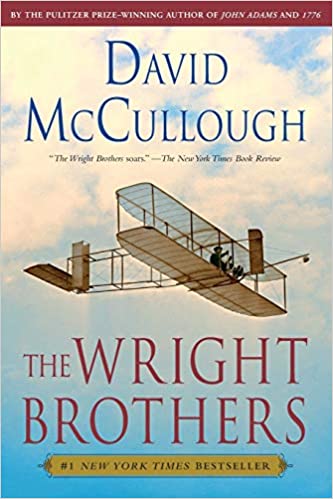Table of contents
In this episode, we talk about "The Wright Brothers" by David McCullough. It's a biography of Wilbur and Orville Wright, best known for inventing the airplane. It contains timeless themes relevant to any and all forms of human endeavour, so in addition to being an amazing story about a turning point for the human race, there's a lot we can learn from it.
We discuss a variety of Taimur’s highlights, below are some of the ones that sparked more conversation during our discussion:
Wilbur Wright: “We had no special advantages. The greatest thing in our favour was growing up in a family where there was always much encouragement towards intellectual curiosity”.
This demonstrates that, despite the fact that the Wright Brothers were not born into a family of great wealth, the reference to curiosity is a nod to living intentionally.
John T. Daniels said later “we couldn’t help thinking they were just a pair of poor nuts who would stand on the beach for hours at a time watching the gulls flying, soaring, dipping”
“They seemed like well-meaning decent enough young men yet there they were neglecting their business wasting their time day after day on that ridiculous flying machine”
Despite undertaking potentially a groundbreaking development, the Wright Brothers were continuously derided for pursuing what many felt was a lost cause. These quotes exemplify this sort of derision yet clearly the Wright brothers were unfazed by what other people thought and therefore they provide a good example of how we should do what we want to do rather than what we feel we should do based on other peoples' opinions.
Wilbur was at such a low point that he declared “not in a thousand years will man ever fly”
A common stage in the journey to developing something is that wherein challenges breed moments of self-doubt. Even the most successful pioneers have self-doubts which should encourage us all to push through our own moments of doubt and personal reflection.
The speech Wilbur delivered, modestly titled “Some Aeronautical Experiments”, would be quoted again and again for years to come.
Even though they had done the first successful flight, the modest title of the speech illustrates that the brothers were not in this endeavour for the external validation. Indeed, when they went on tours of Europe, it was often their sister who did much of the social interaction on behalf of the brothers.
“It was a highly significant fact that until the Wrights succeeded, all attempts at flight with heavier than air machines were dismal failures. But since they showed that the thing could be done, everyone seemed to be able to do it”.
This chimes with a phenomenon that has been explored in greater depth more recently by authors such as Malcolm Gladwell. The idea is that once a barrier is broken, the idea that it cannot be done is removed from people’s minds. The example has been repeated in many other instances when barriers are broken such as Roger Bannister famously breaking the 4-minute mile. Our expectations on what is possible and what is achievable are dependent on what society perceives to be possible and achievable.
“All the money anyone needs is, just enough to prevent one from being a burden to others”
The Wright Brothers by David McCullough
Sponsored by Skillshare
This episode is kindly supported by Skillshare. Invest in lifelong learning - sign up up at www.skillshare.com/notoverthinking for a 2-month free trial. And check out Ali’s video editing class while you’re there :)
